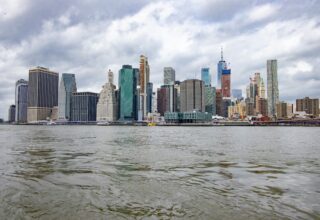By becoming a member of our site, you can add the content you like to your favorites, and present the content you have produced or liked on the internet to our site visitors with the send content option.
Zaten bir üyeliğiniz mevcut mu ? Giriş yapın
By becoming a member of our site, you can add the content you like to your favorites, and present the content you have produced or liked on the internet to our site visitors with the send content option.
You Can Benefit from All Options Exclusive to Our Members by Registering

Next Content:
The Future of Work: Automation and Job Market Trends
- Home Page
- #ClimateChange
- Climate Change and Its Effects on Global Economy
Climate Change and Its Effects on Global Economy

Climate change is having profound effects on the global economy, impacting various sectors and altering economic dynamics worldwide. As the planet experiences more frequent and severe weather events, the economic consequences are becoming increasingly apparent, affecting everything from agriculture to infrastructure and healthcare. Understanding these impacts is crucial for developing strategies to mitigate and adapt to the challenges posed by a changing climate.
One of the most significant effects of climate change on the global economy is its impact on agriculture. Changes in temperature and precipitation patterns, along with the increased frequency of extreme weather events like droughts and floods, are disrupting crop yields and threatening food security. Regions that depend heavily on agriculture are particularly vulnerable, as these changes can lead to reduced productivity, higher food prices, and increased hunger and malnutrition. Additionally, pests and diseases are spreading to new areas as a result of changing climates, further exacerbating the challenges faced by farmers.
Infrastructure is also heavily affected by climate change. Rising sea levels and more intense storms are causing significant damage to coastal infrastructure, including roads, bridges, and buildings. The cost of repairing and reinforcing these structures is substantial, placing a strain on public finances and diverting resources from other essential services. In many parts of the world, outdated infrastructure is not equipped to handle the new climate realities, necessitating significant investment in climate-resilient construction and urban planning.
The energy sector faces its own set of challenges due to climate change. Increased temperatures can reduce the efficiency of power plants, while extreme weather events can damage energy infrastructure and disrupt supply chains. At the same time, the demand for cooling is rising as global temperatures increase, putting additional strain on energy systems. The transition to renewable energy sources is essential for reducing greenhouse gas emissions, but it also requires substantial investment and innovation to ensure reliable and resilient energy supplies.
Health care systems are under pressure from the effects of climate change, as changes in climate patterns can lead to the spread of diseases and an increase in heat-related illnesses. Vector-borne diseases such as malaria and dengue fever are becoming more prevalent in new regions, posing significant public health challenges. Additionally, extreme weather events can cause injuries and fatalities, overwhelming healthcare facilities and resources. Addressing these health impacts requires robust public health infrastructure and proactive measures to prevent and manage climate-related health issues.
The insurance industry is another sector deeply affected by climate change. As natural disasters become more frequent and severe, the cost of insurance claims is rising. This leads to higher premiums and, in some cases, the withdrawal of coverage from high-risk areas. The increased financial risk associated with climate change is prompting insurers to develop new models and strategies to assess and manage these risks, ensuring they can continue to provide coverage in a changing climate.
Economic inequality is being exacerbated by climate change, as poorer regions and communities are often the most vulnerable to its impacts. Developing countries, which are less equipped to cope with climate-related disasters, face greater economic disruptions and slower recovery times. This can lead to increased poverty and migration, as people are forced to leave their homes in search of more stable conditions. Addressing this inequality requires international cooperation and support to help vulnerable regions build resilience and adapt to the changing climate.
We offer our respects and wish you a good reading. – Who Learns What? Team
- On-Site Comments






























